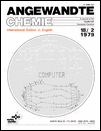Synthesis of the Mast Cell Degranulating (MCD) Peptide from Bee Venom†
Ch. Birr, Lecture at German-Soviet Peptide Symposium, Eibsee 1978.—We are grateful to Prof. Dr. E. Habermann. Giessen, for a sample of MCD peptide.
Abstract
Potential value in the therapy of rheumatism and other inflammation processes could attach to the MCD peptide from bee venom if it were available in larger quantities. The peptide consists of 22 amino acids and contains two disulfide bridges. Its first total synthesis has now been accomplished.




